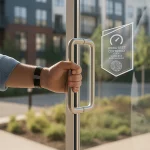Network Rail UK Set to Roll Out Faster Mobile Broadband and Fibre Network
The Government’s Department for Transport has said it plans to make a new generation of “high speed” Mobile Broadband based Internet access services available to 70% of train commuters by 2019, which will focus on eradicating the existing networks many mobile signal “not spots” and boost customer speeds up to 50Mbps.
Apparently the upgrade to Network Rail’s existing infrastructure will target the “busiest parts” of Britain’s network and travellers should begin to notice the first improvements “during 2015“. We strongly suspect that 4G based small cell / femtocell technology will play a part in this as it has done with similar schemes but the details remain sparse.
Advertisement
Patrick McLoughlin, Transport Secretary, said:
“There are few things more frustrating than trying to phone a friend or access the internet, only to be thwarted by bad signal.
Passengers deserve to have the best mobile technology and that is why I am pleased that industry is coming together to make that a reality.
Be it hardworking commuters preparing for the day on their journey into work or leisure travellers making final plans for their weekend away, today’s announcement marks the beginning of the end of poor coverage on our railways.”
The effort appears to form part of Network Rail’s £1.9bn upgrade to their existing telecoms infrastructure and a spokesperson for the operator has made some interesting comments about this. In particular, Network Rail expects telecoms and Internet traffic on its network to reach 200Gbps (Gigabits per second) by 2018 and their enhanced fibre optic network is apparently being designed to handle a total of 192,000 Gigabits per second of data by June 2014.
Admittedly Network Rail’s fibre optic capacity has to manage CCTV cameras, masses of admin tasks, Internet data and a whole host of other things but 192,000 Gbps still seems a little on the high side. In practical terms they’ll also be installing new mobile masts alongside tracks and sticking signal boosters inside train carriages.
It’s unclear whether the new network would continue to block video streaming services but in either case it sounds as if Mobile Network Operators (MNO), such as O2, EE, Vodafone and Three UK, will be helping to pay for the upgrades. How much people will have to pay for this enhanced service is still being discussed.
As good as all this sounds we suspect that most people would rather have on-time trains that didn’t price ordinary people out of the ability to travel.
Advertisement
Mark is a professional technology writer, IT consultant and computer engineer from Dorset (England), he also founded ISPreview in 1999 and enjoys analysing the latest telecoms and broadband developments. Find me on X (Twitter), Mastodon, Facebook, BlueSky, Threads.net and Linkedin.
« Business ISP Vaioni UK Secures GBP500k of Investment
















































Comments are closed